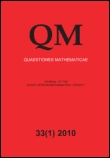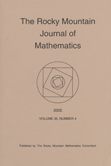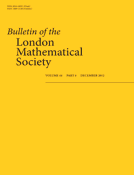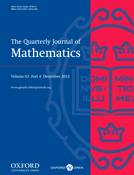
Quaestiones Mathematicae
Scope & Guideline
Unveiling the Rich Tapestry of Mathematical Knowledge
Introduction
Aims and Scopes
- Algebra and Number Theory:
The journal features research on algebraic structures, number fields, and properties of algebraic systems, including topics such as semirings, commutative rings, and number theory involving specific polynomials. - Functional Analysis and Operator Theory:
Several papers focus on functional analysis, particularly properties of operators, spaces, and inequalities, such as the study of Banach spaces, operator semigroups, and various operator-related problems. - Differential Equations and Dynamical Systems:
The journal publishes work on both ordinary and partial differential equations, including stability analysis, existence and uniqueness of solutions, and applications to physical models. - Graph Theory and Combinatorics:
Research on graph properties, coloring problems, and combinatorial structures is prevalent, highlighting the journal's commitment to both theoretical and applied aspects of combinatorial mathematics. - Geometry and Topology:
The journal includes papers on differential geometry, topology, and related mathematical structures, emphasizing the geometric properties of manifolds and spaces. - Mathematical Modeling and Applications:
There is a focus on mathematical modeling in various contexts, including applications in physics, economics, and engineering, indicating the journal's aim to bridge pure and applied mathematics.
Trending and Emerging
- Advanced Operator Theory:
There is a noticeable increase in research related to operator theory, particularly concerning the properties of various operator classes, their applications, and relationships with functional analysis. - Nonlinear Differential Equations:
The journal is witnessing a surge in studies involving nonlinear differential equations, particularly in the context of physical applications and complex systems, highlighting their significance in modern mathematical research. - Algebraic Structures and Their Applications:
Research in advanced algebraic structures, including generalizations of rings and algebras, is becoming more prominent, reflecting an interest in the interplay between algebra and other mathematical disciplines. - Mathematical Physics and Applied Mathematics:
The intersection of mathematics and physics is increasingly represented, with papers focusing on mathematical models that address physical phenomena, suggesting a trend towards interdisciplinary applications. - Topology and Its Applications:
The field of topology, particularly in relation to geometric properties and applications in other domains, is gaining attention, indicating a growing interest in how topological concepts can be applied across different areas of mathematics.
Declining or Waning
- Classical Analysis and Function Theory:
Research in classical analysis and traditional function theory seems to be less emphasized in recent volumes, with fewer papers addressing topics like series convergence and classical function spaces. - Basic Combinatorial Techniques:
While combinatorial topics remain relevant, the basic combinatorial techniques and foundational results have seen a decrease in dedicated articles, suggesting a shift towards more applied or complex combinatorial studies. - Elementary Number Theory:
The focus on elementary number theory topics, such as basic divisibility and congruences, appears to be waning as the journal leans towards more advanced and specialized areas of number theory. - Discrete Mathematics:
Papers specifically dedicated to discrete mathematics and its foundational aspects are becoming less common, indicating a possible shift towards more continuous or analytical approaches in mathematical research.
Similar Journals

PUBLICATIONES MATHEMATICAE DEBRECEN
Bridging Theory and Application in MathematicsPublicationes Mathematicae Debrecen is a renowned international journal published by the University of Debrecen, Institute of Mathematics, situated in Hungary. This journal, with both ISSN 0033-3883 and E-ISSN 2064-2849, has established itself in the field of mathematics since its inception, with coverage extending from 1997 to 2024. Recognized for its rigorous academic standards, it currently holds a Q3 ranking in the mathematics (miscellaneous) category for 2023 and ranks at the 42nd percentile among general mathematics journals in Scopus. Publicationes Mathematicae Debrecen aims to disseminate high-quality research across various areas of mathematics, contributing to the advancement of knowledge and practice in this dynamic field. Although it is not an open-access journal, its readers can access a wealth of scholarly work that addresses both theoretical and applied mathematical issues, making it an invaluable resource for researchers, professionals, and students alike.

ROCKY MOUNTAIN JOURNAL OF MATHEMATICS
Exploring the Depths of Mathematical InnovationROCKY MOUNTAIN JOURNAL OF MATHEMATICS, published by the Rocky Mountain Math Consortium, serves as a critical platform for researchers and practitioners in the field of mathematics since its inception in 1971. With a notable presence in the academic community, this journal covers a broad spectrum of mathematical disciplines, positioning itself in the Q2 category for Mathematics (miscellaneous) as of 2023. Despite being a subscription-based journal, it is recognized for its rigorous peer-review process and contributions to theoretical and applied mathematics, helping to advance knowledge and foster collaboration among mathematicians. The journal's ISSN number is 0035-7596 and its E-ISSN is 1945-3795, reflecting its commitment to accessibility and dissemination of high-quality research. Based in Tempe, Arizona, at Arizona State University, the journal continues to play an important role in shaping contemporary mathematical discourse through well-researched articles and innovative studies, aiming to bridge gaps between various mathematical subfields and engage a diverse audience, including students and established researchers alike.

Kyungpook Mathematical Journal
Elevating Mathematical Understanding Across DisciplinesWelcome to the Kyungpook Mathematical Journal, a prominent publication dedicated to the advancement of mathematical research across various fields, including applied mathematics and miscellaneous mathematical disciplines. Published by the Department of Mathematics at Kyungpook National University in South Korea, this journal aims to disseminate high-quality original articles, fostering a deeper understanding and innovative applications of mathematical theories. With a distinguished Scopus ranking in its category, standing at Q3 in Applied Mathematics and Q3 in Mathematics (miscellaneous), it serves as a crucial platform for both emerging and renowned scholars to share their findings with a global audience. This publication is indexed in reliable databases, ensuring enhanced visibility and impact for its contributors. Even though it currently lacks open-access distribution, the journal remains an essential resource for researchers, professionals, and students looking to stay at the forefront of mathematical exploration from 2007 to 2024 and beyond. Join us in contributing to the vibrant discourse that shapes the future of mathematics.

Pure and Applied Mathematics Quarterly
Connecting Mathematicians Through Quality ResearchPure and Applied Mathematics Quarterly is a prestigious journal published by INT PRESS BOSTON, INC, focusing on the diverse and evolving field of mathematics. Since its inception in 2007, this journal has grown significantly, currently holding a Q1 ranking in the Mathematics (Miscellaneous) category for 2023, positioning it among the leading publications in the discipline. With a commitment to publishing high-quality research, Pure and Applied Mathematics Quarterly fosters innovation and dialogue within the mathematical community by providing a platform for theoretical advancements and practical applications. The journal remains accessible to researchers and professionals through its ISSN 1558-8599 and E-ISSN 1558-8602, although it does not currently offer open access. As a vital resource for mathematicians, educators, and students, this journal endeavors to expand the frontiers of mathematical knowledge and contribute to the academic dialogue surrounding this fundamental science.

Dissertationes Mathematicae
Fostering Interdisciplinary Connections in Mathematics.Dissertationes Mathematicae is a prestigious academic journal published by the Polish Academy of Sciences Institute of Mathematics (IMPan), renowned for its contributions to the field of mathematics since its inception. With an impressive Q1 ranking in the miscellaneous mathematics category for 2023 and positioned at Rank #73 out of 399 in General Mathematics according to Scopus, this journal serves as a pivotal platform for disseminating high-quality research and innovative theoretical developments. Spanning from 2000 to 2024, it focuses on a broad range of mathematical disciplines, encouraging interdisciplinary collaboration and advancing mathematical understanding globally. While it currently does not offer open access, the journal is highly regarded in academic circles and continues to attract submissions from respected researchers and institutions. With a commitment to excellence and a notable impact factor, Dissertationes Mathematicae plays a crucial role in the ongoing development of mathematical theories and applications, making it an essential resource for researchers, professionals, and students alike.

BULLETIN OF THE LONDON MATHEMATICAL SOCIETY
Connecting Scholars Through Mathematical ExcellenceThe BULLETIN OF THE LONDON MATHEMATICAL SOCIETY, published by Wiley, is a distinguished journal that serves as a vital resource in the field of mathematics. With its ISSN 0024-6093 and E-ISSN 1469-2120, this journal has consistently provided a platform for innovative research and scholarly discourse since its inception in 1969. Recognized for its quality, it currently holds an impressive Q1 ranking in the mathematics category, a testament to its significance in disseminating influential findings and trends in the mathematical sciences. Researchers and practitioners can rely on the BULLETIN for its comprehensive coverage of both theoretical and applied mathematics, which caters to a diverse audience ranging from professionals to students alike. Though it does not currently offer Open Access options, its articles can be accessed through institutional subscriptions, ensuring that significant works reach the academic community effectively. With contributions that span over five decades, the journal continues to shape mathematical research and inspire future advancements in the discipline.

CZECHOSLOVAK MATHEMATICAL JOURNAL
Advancing Mathematical FrontiersCzechoslovak Mathematical Journal is a distinguished academic journal published by Springer Heidelberg, dedicated to advancing the field of mathematics through the dissemination of high-quality research. With an ISSN of 0011-4642 and E-ISSN 1572-9141, this journal has been a pivotal platform for mathematicians and researchers from around the globe since its inception. The journal holds a Q3 ranking in the field of Mathematics (miscellaneous), demonstrating its commitment to providing a forum for the latest mathematical theories and applications, particularly in general mathematics, as indicated by its Scopus rank of #285/399 and 28th percentile in the field. While currently not offering open access options, the journal continues to attract a wide readership by making its valuable content available through traditional subscription models. The Czechoslovak Mathematical Journal serves as an essential resource for researchers, professionals, and students aiming to stay informed about recent developments and breakthroughs in mathematics, with focus years converging from 1995 to 2024.

Acta Universitatis Sapientiae-Mathematica
Connecting researchers to the forefront of mathematical innovation.Acta Universitatis Sapientiae-Mathematica is a dynamic and open-access academic journal published by SCIENDO, dedicated to advancing research in the field of mathematics. With its roots grounded in Germany, the journal has made significant strides in promoting scholarly contributions since it became open access in 2013, enhancing accessibility for researchers, professionals, and students alike. Spanning a broad spectrum of mathematical disciplines, including general mathematics, the journal engages with contemporary challenges and offers a platform to explore innovative approaches. Although currently positioned in the Q4 quartile for 2023 within the miscellaneous mathematics category and holding a Scopus rank of #290 out of 399, the journal is committed to fostering intellectual discourse and enhancing the overall quality of mathematics research. The convergence of research presented since 2014 showcases a journey toward improvement and expanding its influence in the mathematical community. Contribute to the vibrant dialogue in mathematics by exploring the latest findings in Acta Universitatis Sapientiae-Mathematica as it continues to evolve in the academic landscape.

QUARTERLY JOURNAL OF MATHEMATICS
Illuminating the Path of Mathematical DiscoveryQuarterly Journal of Mathematics, published by Oxford University Press, stands as a pivotal resource for the mathematical community, focusing on a broad spectrum of topics in the field of mathematics. With its esteemed history dating back to 1930, this journal continues to foster innovative research and discussions, providing a platform for scholars to share their findings and insights. Although the journal currently holds a Q3 classification in mathematics (miscellaneous) and is ranked #207 among general mathematics publications in the Scopus database, its commitment to quality and rigorous peer review ensures that it remains relevant and insightful. Researchers, professionals, and students alike will find the Quarterly Journal of Mathematics an invaluable tool for advancing knowledge and understanding in various mathematical disciplines, making it an essential addition to any academic library.

Commentationes Mathematicae Universitatis Carolinae
Nurturing Emerging Research in MathematicsCommentationes Mathematicae Universitatis Carolinae, with ISSN 0010-2628 and E-ISSN 1213-7243, is a distinguished academic journal published by the Faculty of Mathematics and Physics at Charles University in the Czech Republic. Established in 1996, this journal serves as a platform for original research articles and contributions in the field of mathematics, catering to a diverse range of topics within the discipline. While classified in the Q4 quartile for 2023, it occupies an important niche within the mathematical community, particularly for emerging research and comprehensive studies. Although it is not open access, it offers authors an opportunity to disseminate their work through a reputable publisher, renowned for its scholarly contributions. With a focus on fostering academic discourse, Commentationes Mathematicae aims to engage researchers, professionals, and students alike, enriching the mathematical landscape and promoting collaboration within the field.